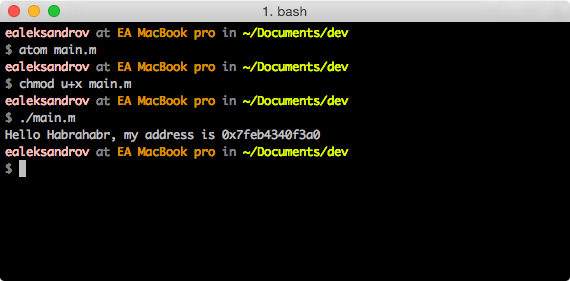Objective-C Minimalism
I often write small test projects on Objective-C to experiment or play with something. Usually, I put the code in main.m and get rid of everything else:
This is a complete project from a single file, ready to run. Under the cut - a description of techniques that allowed to come to this minimalism.
')
Translator's note: in the absence of
This is a

#!/usr/bin/env objc-run @import Foundation; @implementation Hello : NSObject - (void) sayHelloTo:name { printf("Hello %s, my address is %p\n", [name UTF8String], self); } @end int main () { id hello = [Hello new]; [hello sayHelloTo:@"sunshine"]; } This is a complete project from a single file, ready to run. Under the cut - a description of techniques that allowed to come to this minimalism.
- Everything is written in main.m. Or “Test.m”, or whatever. The main () function can be in any file.
- Use objc-run. If you haven't encountered it yet , objc-run is a great utility that “makes it easy to use Objective-C files as console script-like tasks.” Install it:
brew install objc-runbrew install objc-runand add permissions to execute your source file:chmod u+x main.m - Modules instead of precompiled headers. Perhaps it makes sense in #imports and PCH in large projects, but for small test programs? No, really.
- No
@interfaceads I accidentally found out that ObjC allows you to specify a superclass directly in the@implementationdirective. It is not entirely clear why this was allowed, but this allows you to completely get rid of the@interfaceblock. - Implicit types of parameters of functions. The return types and parameters of ObjC methods are implicitly equal (id), which means
-(id)doSomethingWith:(id)param; this is exactly the same as-doSomethingWith:param; but the second option looks more convenient. - No arguments in main (). Although this is considered a bad practice, it is perfectly acceptable to write
void main ()instead ofint main (int argc, char**argv). Why declare it all, if you still do not use these arguments? - Get rid of
returninmain(). Starting from the C99 standard, when returning control frommain()without a return statement, it is considered thatreturn 0;was calledreturn 0; - printf instead of NSLog. NSLog - for error messages, not for text output - I do not need to display the path to the executable file and the thread ID on each line.
')
Translator's note: in the absence of
@interface warning warning annoys me: /dev/fd/63:3:17: warning: cannot find interface declaration for 'Hello' @implementation Hello : NSObject ^ 1 warning generated. This is a
warn_undef_interface for which there is no corresponding -W flag (to silence warnings by type). So for myself, I left an empty interface. #!/usr/bin/env objc-run @import Foundation; @interface Hello : NSObject @end @implementation Hello - (void) sayHelloTo:name { printf("Hello %s, my address is %p\n", [name UTF8String], self); } @end int main () { id hello = [Hello new]; [hello sayHelloTo:@"sunshine"]; } 
Source: https://habr.com/ru/post/242621/
All Articles